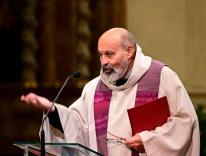When people ask what I do for a living, I say, “I work for a magazine,” and “Yes, they still exist!” and “We have a small staff, so everybody does a little bit of everything.”
As Commonweal’s marketing coordinator, my tasks range from ordering red pencils to proofreading pages; from tweeting links to our website to combing archives for articles we’d like to republish online. I change our Facebook profile picture when the new issue comes out, and I alert the printer to the number of copies of each issue he needs to print. I coordinate our local reader communities across the country and—with the cooperation of a few willing millennials—have just helped launch a Commonweal discussion group in New York City (with beer and wine as inducements). Questions about the copy machine or “that book” or “those envelopes” also come to me, as do subscribers’ difficulties with accessing the website or downloading the app.
The other day I was on Twitter to see who was talking about @commonwealmag. “Liberal Catholics still trotting out the old chestnuts,” one tweet read. “For some people it’s always 1968.” This person was responding to a tweet that linked to a Commonweal article written in 1968 by moral theologian Fr. Bernard Häring. Häring had urged those whose informed consciences could not accept Humanae Vitae to speak out against it “as a service of love for the pope.” The pope, Häring was sure, had also written the encyclical in a service of love. Häring was a very careful theologian, and it was obvious to me that the Twitter user had not even read the article.
I then got an email from the leader of our Milwaukee reader group. “Thank you for the link to the 1968 article,” he wrote. “I am sure I read it at the time. I thought [Humanae Vitae] was a terrible decision, mainly because I thought the hierarchical church lost a lot of its credibility with the real church—‘The People of God.’” I thanked him; I also agreed with him. I was grateful to learn that it wasn’t just young people (I was born in 1989) who, in the words of Häring, “do not think it’s an insult to the Holy Spirit if [one has] doubts about the rhythm method.”
But I knew that. My great-grandmother raised eight kids. In 1934, she submitted an article about birth control that was rejected by America, the Ecclesiastical Review, and Truth. “You’re a laywoman,” one rejection letter said, “and frankly there isn’t anything the laity can do about this.” She should have submitted it to Commonweal, where the theologian Bernard Häring, thirty-four-years later, would say that the real issue about birth control was not “a misunderstanding of Christian marriage,” but an “outmoded understanding of curial power.”
When we began planning website coverage for Commonweal’s ninetieth-anniversary year, we decided not to focus on contraception or abortion. “People are sick of it, especially young people,” I said. We made an exception for the Häring piece. As someone with no historical experience of Vatican II, and with only an incomplete education about what happened there (the priest turned around and everyone started praying in English for the first time, right?), I’ve found it fascinating to see how the arguments played out in real time. Even more surprising was learning that the church seemed more open to a range of opinions forty years ago than it has been, at least in my experience, during my formative years.
One of my friends works for a Catholic organization in Washington, D.C. He lobbies on behalf of immigrants, the working poor, and prison inmates. We studied theology together at Fordham, and like most of my friends, we very much believe that Catholic social teaching is the indispensable core of Catholicism. We were taught that forming relationships with those on the margins of society and fighting against the systematic oppression of the poor is central to our faith. We hardly ever talked about abortion and contraception. Like the exclusion of women from the priesthood, those were topics we’d been conditioned to “give up on,” topics about which everything that needed to be said had already been said. Our focus has been elsewhere. A good example of this was my friend’s reaction to the editorial, “The Truth about Marriage,” that ran in Commonweal’s August 2013 issue. “This editorial really pissed me off,” he said. The tone was too diplomatic, too careful. “It didn’t challenge anyone to think differently [about same-sex marriage] than the bishops.” The magazine is too academic, he complained. There should be more stories grounded in human experience, particularly the experience of those struggling to get by, and fewer on obscure intellectual, theological, or political questions. I often think the same thing. When proofreading a forthcoming issue, I have upon occasion firmly gripped my red pencil and written “SO WHAT!” in the margins.
About once a month, I get a phone call from one of our readers in Detroit who gives me the “on the ground update” about who is taking the free copies of Commonweal I send him. He distributes them (as part of what he calls his “evangelizing mission” to “make people think”) at two parishes: one poor, downtown; the other affluent, in a suburb (where he had to “strong-arm” the pastor into letting him leave a stack of ten by the bulletins). I asked him if he thought the magazine was “too academic.” “Well sure,” he said “Commonweal is for literary geniuses. You should tone it down a little bit” because, he continued, “Do you know what? The people from the poor parish—people who aren’t so poor, but who struggle to get a stew on their table—they line up at the door when I bring the magazines, they’re seeking out the commentary in your publication. And the people who are eating filet mignon turn a blind eye.” I laugh.
Sure, what seems like the inconclusiveness of decades of debate often drives me crazy. But I also know that those exasperating intellectual and theological debates are an essential part of human experience. Whether I like it or not, this never-ending contestation of views is very much a part of my American Catholic heritage—and it matters.
From our 90th Anniversary feature "Formative Years," in which we asked a number of our former staff members (along with our current marketing coordinator) to write about their responsibilities at Commonweal, what they learned while working here, and about their hopes for the future of the magazine. See all of their contributions here.


